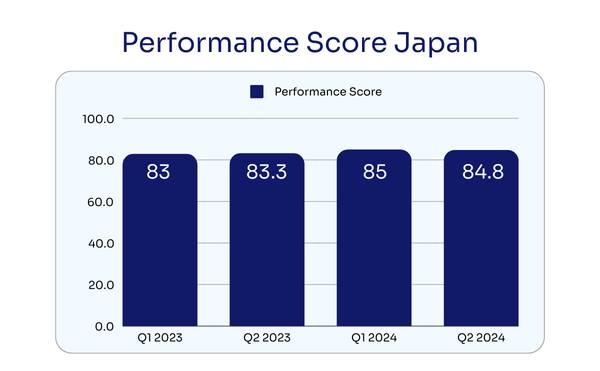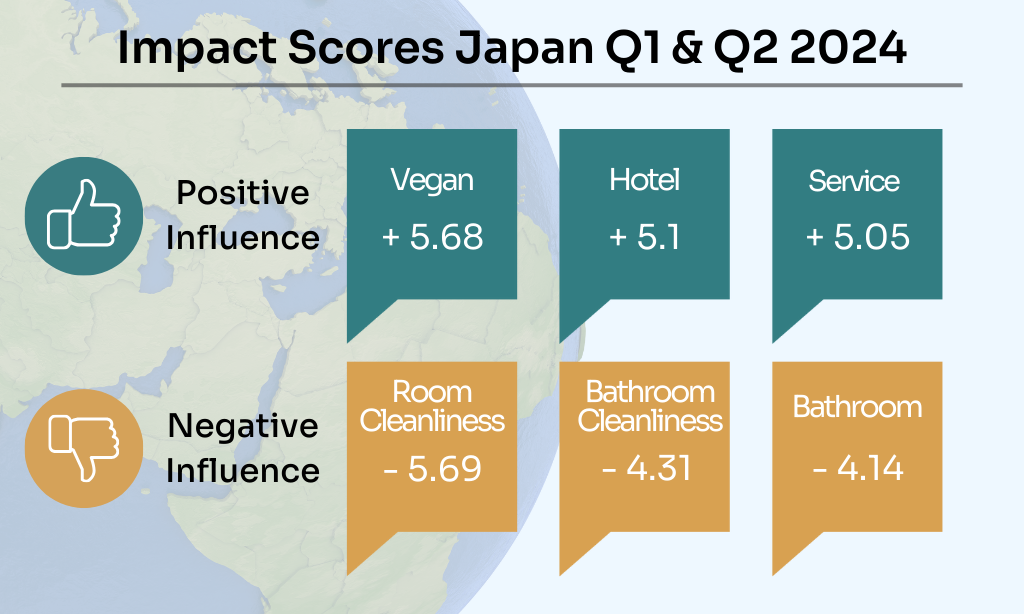Part 5 – Japan
In part 1 of the Pulse of the Industry Global edition, we already took a deep dive into the metrics that TrustYou analyzed for the hospitality industry for Q1 and Q2 2024. Now, let’s take a closer look at the Japan hospitality statistics 2024 and industry insights.
Japan, a country renowned for its rich culture and unique hospitality, has faced a dynamic environment within its hotel industry since the start of 2024. From changing consumer preferences to technological advancements and industry trends, the hospitality sector in Japan has been undergoing significant shifts.
Trends in 2024
Tech Integration
The integration of technology into hotel operations has been on the rise, with advancements in contactless check-ins, digital concierge services, and personalized guest experiences. For instance, “Hen na Hotel” in Japan is known for being the first hotel where robots serve as staff members, providing services to guests. This unique and high-tech concept has garnered attention both locally and internationally, making it a standout example of how technology is transforming the hospitality industry in Japan.
Sustainability Initiatives
Japanese hotels have been increasingly focusing on sustainable practices, such as reducing plastic waste, implementing energy-efficient solutions, and promoting eco-friendly amenities.
Rise of Boutique Hotels
The trend towards boutique hotels offering unique experiences and personalized services has gained traction in Japan, appealing to niche markets and experiential travelers.

Challenges Faced
Staffing Shortages
Similar to global trends, Japan has also encountered challenges in recruiting and retaining skilled hospitality staff, impacting service quality and operational efficiency.
Tourism Recovery
The hotel industry in Japan has been navigating the effects of the pandemic on tourism, with uncertainties around international travel restrictions and fluctuations in domestic tourism patterns. TrustYou’s Performance Score analysis for Japan shows that these efforts have paid off over the last two years. While in Q1 and Q2 of 2023 the performance score was still at 83 and 83.3 it has increased to 85 for Q1 2024 and just a little lower (84.4) in Q2 2024. This is significantly higher than the global average of 81.7 and 81.5 for the first two quarters of 2024.

Competitive Market
The competitive landscape in Japan’s hospitality sector has intensified, requiring hotels to differentiate themselves through innovative offerings and exceptional guest experiences.
Expectations for 2025
Technology Integration
Further advancements in technology integration are expected, with a focus on enhancing guest experiences through artificial intelligence, automation, and data analytics.
Sustainable Practices
Continued emphasis on sustainability practices, including carbon neutrality goals, waste reduction, and eco-friendly certifications to meet evolving consumer preferences.

Revival of Tourism
Anticipation for a resurgence in tourism activities, driven by the easing of travel restrictions and promotional efforts to attract international visitors back to Japan’s diverse destinations. The introduction of immersive cultural experiences and activities, such as forest bathing and ikigai classes at hotels like Azumi in Japan’s Setouchi region, is aimed at providing guests with memorable and enriching stays. By offering these distinctive and culturally immersive experiences, hotels are creating a niche appeal and tapping into the growing demand for authentic and meaningful travel experiences.
What has been particularly identified as a positive impact by travelers in hotels in Japan was vegan food options. TrustYou’s Impact Score analysis shows that hotels that offer a wide range of vegan meals or alternatives, can significantly improve their scores (+5.68). Also, service was identified as being very impactful with +5.05. On the other hand, cleanliness had the biggest negative impact on hotels’ performances in the first half of 2024. Room Cleanliness (-5.69) and Bathroom cleanliness (-4.31) have been identified as the biggest issues that guests identified during their stay.



